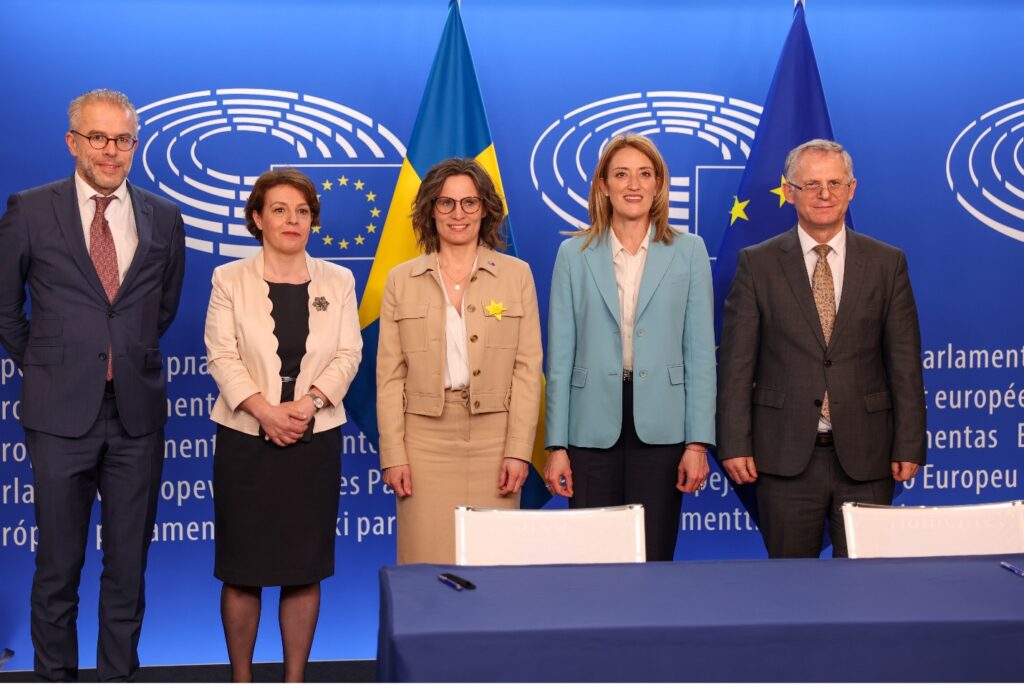Visa Liberalization
The dialogue between Kosovo and the European Commission on visa liberalization started on 19 January 2012. In order to coordinate the dialogue on visa liberalization, the relevant structures were established, namely the Steering Committee for Visa Liberalization at the political level and the Secretariat for Visa Liberalization at the technical level, chaired at that time by the Ministry of European Integration (MIE) and the Ministry of Internal Affairs (MIA). On 14 June 2012, Kosovo received the Visa Liberalization Roadmap , which identified all the measures that Kosovo should adopt and implement to advance towards visa liberalization. In April 2013, the Government approved the action plan for visa liberalization committing to fulfill the steps to achieve the set objectives through a dynamic approach. This dynamic approach to the visa liberalization dialogue sets a slightly different pace regarding the monitoring and implementation of the visa liberalization plan. The European Commission has published four official reports evaluating the progress achieved by the country’s institutions against the criteria presented in the Roadmap.
On 4 May 2016, the European Commission approved the recommendation for the lifting of visas for Kosovo as it has been assessed that Kosovo has implemented the obligations issued by the visa liberalization roadmap. While in July 2016, the European Parliament’s Foreign Affairs Committee issued a recommendation to the European Parliament’s Committee on Civil Liberties to approve the visa waiver recommendation. In the last report published on 18 July 2018, the fulfillment of all criteria was confirmed. Based on this report, following the ratification of the border demarcation agreement with Montenegro on 21 March 2018, one of the two remaining criteria has been fulfilled. The latest report also confirms that Kosovo continues to meet all other criteria set out in the Visa Liberalization Roadmap regarding re-admission and re-integration, document security, migration and border management, public order and security and fundamental rights related to freedom of movement.
On 30 August 2018, the Committee for Civil Liberties, Justice and Internal Affairs (LIBE) approved the Commission’s report with 30 votes in favour, 10 against, and 2 abstentions. While on 13 September 2018, the European Parliament voted on the recommendation of the LIBE Committee with 420 votes in favour and 186 against. Even though the criteria were met, there was no willingness on the part of the EU Member States to discuss and vote on this issue in the EU Council.
In 2022, the Government of Kosovo worked closely with the European Commission and the Czech Presidency of the EU to put this issue back on the EU Council agenda. On 12 August 2022, the Government of Kosovo submitted an updated technical report to the European Commission, emphasizing achievements in the rule of law, the fight against corruption and organized crime, reintegration, asylum and migration management. Following the positive assessment of this update, the Czech Presidency included it on the Council agenda in the visa working group, thereby unblocking a process that had been stalled for 4 years.
On 14 October 2022, the visa liberalization file for Kosovo passes to the Visa Working Group within the EU Council. On 22 November 2022, at the meeting of the Visa Working Group, it was agreed that citizens holding Kosovo passports will move freely in the Schengen area after the operationalization of the ETIAS system on 1 November 2023 or on 1 January 2024, in case of postponing the operationalization of the ETIAS system.
On 22 November 2022, the Visa Working Group agreed to the proposal for visa liberalization for Kosovo citizens. Then, on 30 November, the Council, through the ambassadors of EU Member States in the COREPER II format, voted in favour of this proposal for visa liberalization.
On 15 December 2022, Representatives of the Council Presidency and the European Parliament reached an agreement to draft a regulation on visa liberalization that will come into effect whenever the ETIAS system is operational but no later than 1 January 2024. This proposal was voted on in COREPER II on 20 December 2022.
On 12 January 2023, the Committee for Civil Liberties, Justice and Internal Affairs (LIBE) approved the proposal with 48 votes in favour, 7 against and 1 abstention, to allow the free travel of Kosovo citizens no later than 1 January 2024.
On 9 March 2023, the Council of Ministers unanimously approved the decision on visa liberalization.
On 18 April 2023, the European Parliament approved Regulation (EU) 2023/850 – and the amendment of Regulation (EU) 2018/1806 to add Kosovo to the list of territories whose citizens can travel without visa to the Schengen area. The ceremony of signing the regulation was held on 19 April 2023 at the European Parliament in Strasbourg in the presence of the President of the Parliament, Roberta Metsola and the representative of the Swedish Presidency, Jessika Roswall, Minister for Europe. The First Deputy Prime Minister of the Republic of Kosovo for European Integration, Economic Development and Dialogue, Besnik Bislimi and the Minister of Foreign Affairs and Diaspora, Donika Gërvalla, as well as the rapporteur from the European Parliament, Thijs Reuten, were also present at the ceremony. After signing the decision, the Deputy Prime Minister Bislimi stated that “This decision sends a strong signal that our citizens belong to Europe”.
EU Regulation 2023/850 has already been published in the EU Official Journal and entered into force on 15 May 2023. According to it, citizens of Kosovo with biometric passports will enjoy the right to travel without visas for short-term visits starting from 1 January 2024.








